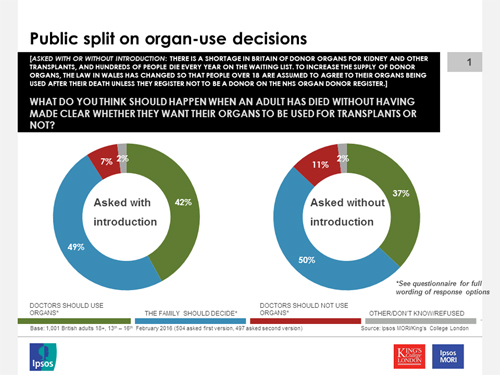Wishes of organ donors should take priority over wishes of their families, public says
The vast majority of the British public think that the wishes of somebody who wants to become an organ donor after their death should be followed, even if their family disagrees, according to a new opinion poll. At present, NHS doctors will not use organs if the potential donor’s next of kin objects, even though the law allows the doctors to do so.
The telephone survey, conducted for King’s College London in February by Ipsos, asked one question to half the sample and a differently-phrased question to the other half. One question emphasised the rights of the potential donor and the other the rights of the family, to see if this made a difference to the answers. Both versions found people thought by a very wide margin that the wishes of the donor should take priority over the wishes of the family. Asked if the family “should or should not be able to block the use of organs from an adult who had agreed to be a donor before they died”, 88% said the family should not be able to block their use and only 9% that they should. When the question asked if “doctors should or should not respect the wishes of the family”, 82% said that they should not, compared to 14% who thought they should.

The poll also asked what should happen when somebody has died without having made clear whether they want their organs to be used for transplants or not. The law has recently changed in Wales from an “opt-in” to an “opt-out” system, allowing doctors to use organs from any adult who has not made clear that they do not want this to happen. In this case the public is much more evenly divided on whether the family’s views should be taken into account, with around half believing that the family should make the decision when the potential donor’s views are not known.
The poll found that if people are simply asked what they think should happen if somebody dies without having made their wishes clear, 50% think that the dead person’s family should decide whether their organs should be used or not; 37% think that doctors should be free to use the organs, and 11% that the organs should not be used in these circumstances. If, instead, they are told about the shortage of donor organs and about the change to the law in Wales, the result is still that half (49%) think that the family should decide; 42% who are asked the question this way say that doctors should be free to use the organs and 7% that they should not.

Anna Quigley, Ipsos’s Head of Health Research, said:
“The results provide food for thought for health professionals and law makers. While it will be difficult for everyone involved when the family is opposed to organ donation, there is clear support for respecting the wishes of the potential donor over those of their family. At the same time, the results also show the situation is even more challenging when the person’s wishes are not known.”
Technical note
- Ipsos interviewed a representative sample of 1,001 GB adults by telephone on 13-16 February 2016. Data is weighted to match the profile of the population. The questions were included on Ipsos’s Political Monitor survey for February.
- The survey was conducted for the Polling Club at King’s College London. The Polling Club, run by Professor Roger Mortimore, allows students to increase their knowledge and understanding of survey research and public opinion by helping to design and analyse the results from a poll carried out by Ipsos. For further details about the Polling Club, contact Professor Mortimore.



